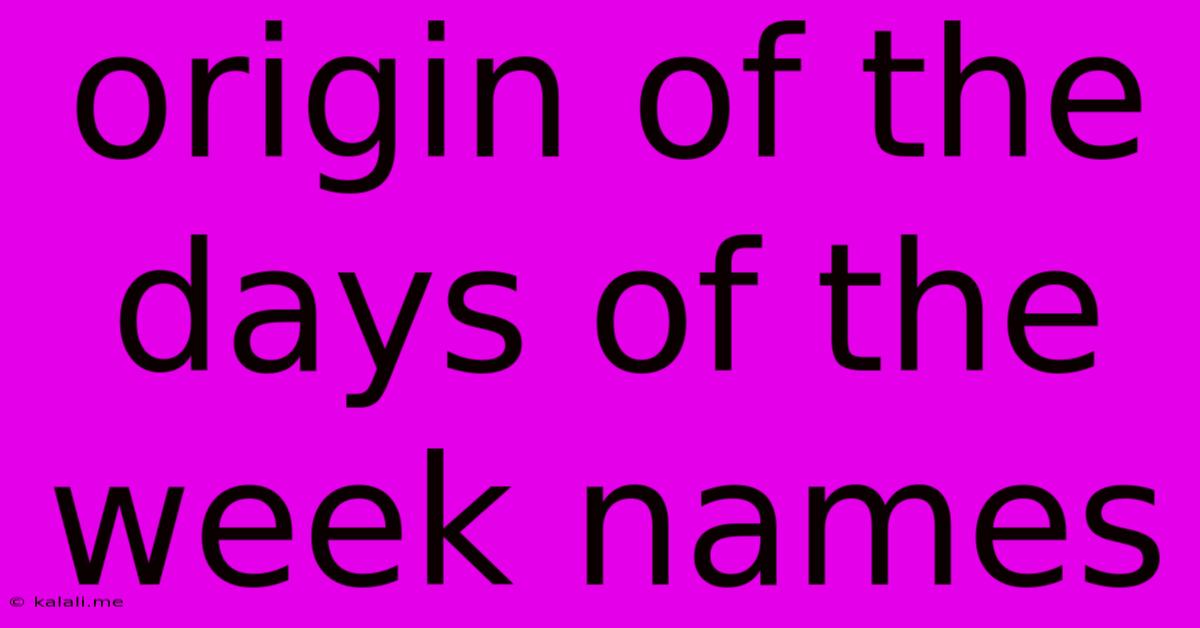Origin Of The Days Of The Week Names
Kalali
Jun 04, 2025 · 3 min read

Table of Contents
The Curious Origins of the Days of the Week: A Journey Through Mythology and History
Ever wondered why Monday is called Monday, or why Saturday is named after Saturn? The names of our days of the week offer a fascinating glimpse into history, revealing a rich tapestry of mythology, Roman influence, and ancient celestial observations. This article delves into the etymological origins of each day, unraveling the stories behind their names and illuminating their connections to the past.
The seven-day week, the foundation upon which our modern calendar is built, originated in ancient Mesopotamia, with its roots further back in Babylonian astronomy. Each day was dedicated to a celestial body, a practice that spread throughout the ancient world, eventually influencing the names we use today.
Sunday: The Sun's Day
Sunday, the first day of the week for many, is a direct reflection of its namesake: the Sun. The Anglo-Saxons called it Sunnandæg, literally translating to "Sun's day." Across various cultures, the sun, the source of life and warmth, held a position of paramount importance, solidifying its place as the dominant deity in many pantheons. This reverence is evident in the names for Sunday across numerous languages, consistently referencing the sun.
Monday: Moon's Day
Following the sun's reign, we arrive at Monday, also known as Monandæg by the Anglo-Saxons. This name, meaning "Moon's day," points to the lunar cycle's significance in ancient cultures, used for tracking time long before sophisticated calendars existed. The moon's influence on tides and agriculture cemented its place in early belief systems, leading to its association with the second day of the week.
Tuesday: Tiw's Day
Tuesday, a day often associated with the middle of the work week, derives its name from the Anglo-Saxon Tiwesdæg, honoring Tiw, the Anglo-Saxon god of war. Tiw is the equivalent of the Roman god Mars, and in many languages, Tuesday retains a connection to Mars, highlighting the strong Roman influence on Western cultures and calendars.
Wednesday: Woden's Day
Wednesday, Wōdnesdæg in Old English, pays tribute to Woden, the chief Anglo-Saxon god. Woden, also known as Odin in Norse mythology, represents wisdom, poetry, and magic. This day's association with Woden reflects the deep-seated spiritual beliefs of Germanic tribes who held Woden in high regard, underscoring the impact of their mythology on our week's structure. This connection to Odin is echoed in other Germanic languages.
Thursday: Thor's Day
Thursday, Þunresdæg in Old English, is named after Thor, the Norse god of thunder and lightning. Similar to Woden's influence, Thor's prominence in Norse mythology contributed significantly to shaping this day's name. Thor, renowned for his strength and power, leaves his mark on our calendars, reflecting the lasting impact of Norse beliefs.
Friday: Frigg's Day
Friday, deriving from the Old English Frīgedæg, honors Frigg, the Norse goddess of love, beauty, and motherhood. Frigg, wife of Odin, holds a significant position in Norse mythology, and her association with this day reflects the importance of feminine deities within the ancient pantheon. The name Friday also reflects the influence of the Roman goddess, Venus, further emphasizing the complex intertwining of various mythological systems in the evolution of our week.
Saturday: Saturn's Day
Finally, we reach Saturday, Sæternesdæg in Old English. This day takes its name from Saturn, the Roman god of agriculture and time. Saturn's prominence in the Roman pantheon ensured his inclusion in the naming of the days of the week, reflecting the Roman Empire's significant cultural and political influence on Europe. This connection is consistent across many European languages.
In conclusion, the names of the days of the week are not arbitrary; they are linguistic fossils, preserving echoes of ancient mythology, religious beliefs, and celestial observations. Each name offers a unique window into the cultural and historical influences that shaped our modern calendar, reminding us of the enduring legacy of past civilizations.
Latest Posts
Latest Posts
-
How Do You Remove Concrete Stain
Jun 05, 2025
-
While Upgrade Ubuntu 24 04 I Got Screen Locker Error
Jun 05, 2025
-
How Do You Say Cuddly In Spanish
Jun 05, 2025
-
Did Erens Dad Let Eren Eat Him
Jun 05, 2025
-
How Do I Know The Dimensions Of My Screw
Jun 05, 2025
Related Post
Thank you for visiting our website which covers about Origin Of The Days Of The Week Names . We hope the information provided has been useful to you. Feel free to contact us if you have any questions or need further assistance. See you next time and don't miss to bookmark.